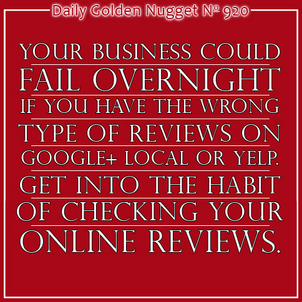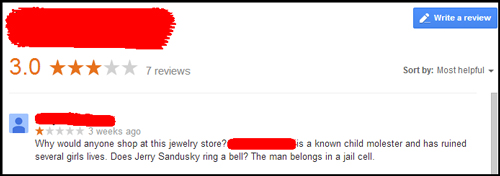 This is not my typical Friday Jewelry website review. I started out the normal way by opening my Chrome web browser in incognito mode, and I searched for the phrase "jewelry stores" followed by a town name.
This is not my typical Friday Jewelry website review. I started out the normal way by opening my Chrome web browser in incognito mode, and I searched for the phrase "jewelry stores" followed by a town name.I found a good candidate for a review, and I even browsed around their website and Facebook page for a while to find out a little more about them before I started to write.
As it turns out, I'm not doing a review of a website today, but I'm going to cover an extremely sensitive topic that was mentioned in their online Google reviews. It's so sensitive that I have to take a step back and change all the names I mention in this Nugget, and explain how this can, and potentially will, destroy their business.
As usual, I began searching for the phrase "jewelry stores [Anytown, USA]" and started reviewing the top results.
The search results page had 1 organic listing above the group of Google+ Local listings. The organic result and the first +Local result were for the same jewelry store.
Normally I would just select the first organic listing for these reviews because that's what a casual internet user would do, but then I noticed that my candidate store had an average 3-star review with 7 Google reviews, but the second listed jewelry store had an average 4.6-star review with 34 Google reviews.
Google puts these star ratings in the SERPs so users can make faster, more informed choices. The 4.6 stars would probably draw more attention than 3 stars, but the top listing organic placement also pulls a lot of weight.
I don't think I've ever seen a retail jeweler with a review average as low as 3-stars, so I decided to take a look at the reasons behind the 3 stars.
I. Was. Speechless.
This was the review:

This is it.
That review is the Number 1 reason you should pay attention to what people say about you online.
This is the deadly topic I told Rob Bates about when he interviewed me for his JCK Magazine article Online Reputation Management.
This is the nightmare accusation where people believe you are guilty until proven innocent. If you get a review like that you need to stop what you're doing immediately and take action.
If it's true, well, you probably wouldn't be in business much longer anyway.
I'm not going to repeat the phrase in the above review because I don't want that phrase listed anywhere on my website, or in my email. I don't even want to touch that phrase with a 10 foot pole! Now that I think about it, maybe that's the reason Rob Bates didn't mention it in his JCK article either.
The only way you will know what I'm talking about is to read that image above.
This is the ultimate reputation management issue! I looked into this as best as I could and it seemed like a case of mistaken identity between John Smith of Sometown, USA, and a different John Smith of Anytown, USA. I discovered that they did have different middle names.
These types of crimes are usually very publicly documented and the court records are readily available. I'm actually looking at the online PDF of the Sometown, USA court case right now as I write this. It would only take a few minutes for someone to trace this information too, but potential customers won't bother doing this research, they're more likely to run away screaming.
It looks like the reviewer didn't have their facts straight, and I don't know why someone would post such a slanderous review when the facts are easy to find. They must have felt very certain, even though they were wrong.
One of the benefits of Google+ is that all reviews are publicly posted in your account. I looked at the reviewer's Google+ account for more details, but everything was blank. In case you don't yet know, it's almost impossible to have a blank Google+ account if you are a real person.
Maybe the reviewer wasn't a real person?
The reviewer's name seemed legitimate, but even with all my armature sleuth online people finding skills I could only find one person with that same name in Europe, not the USA.
I can name at least 9 online review systems off the top of my head, including Google and Yelp. A review in any one of these systems can easily go unnoticed for weeks.
Pretending for a moment that I was a real customer searching for a local jewelry store, this review would frighten me away immediately, and I would call up every friend or relative who lives in the area to ask if they knew anything about it. That's an immediately loss of business for the jeweler.
If this were a "normal" bad review it could be answered online and then you could move on with your business, but nothing good will come of this review. Even when the review is taken down, undoubtedly there are local residence who saw this review, and rumors will spread.
With all this information at hand I called the store to alert them. As it turns out, John Smith was not aware of this review, even though it was posted 3 weeks ago. I guided them through some methods of fixing this problem.
If You Had To Clean This Up:
1. First of all, you have to log into the Google account you use to manage all your online business properties. Then you have to flag that review as inappropriate. But that won't remove the review; it only alerts Google that the review needs to be looked at.
2. Next, while you are waiting for Google to review and delete the review, using the same master Google account, you need to write a public reply immediately. This might be one of the ONLY situations where I would recommend that you caps lock the first sentence of your message to make sure this case of mistaken identity is clearly understood. Perhaps saying "MISTAKEN IDENTITY" followed by more details.
Remember that people are usually assumed guilty for this crime. My personal opinion is to deflect this comment by saying "it's a mistaken identity of John Smith of Sometown, USA, and John Smith of Anytown, USA" rather than saying "this is not true."
Simply claiming that these types of accusations are not true still leaves reasonable doubt in someone's mind. Deflecting toward the actual (convicted) guilty party is a much better defense in this situation.
3. Now you have to contact Google directly to see if they can have the review pulled quickly. Do a search for "Places for Business Report inappropriate reviews" and look for the Google Places (or Google Business) Help pages.
This was the correct help page at the time of this writing:
https://support.google.com/places/answer/2622994
Look for the Contact Us link and request submit a request for Google to call you so you can explain what's happening. In this case I would also alert them to the possibility that the reviewer registered a bogus account just to write this review.
4. Alternatively, if the reviewer does have a legitimate looking account, you could attempt to contact them and explain the case of the mistaken identity, maybe even showing proof. You could politely ask them to delete the review they wrote, which would remove it from the internet immediately. This is the fastest way to solve the problem.
However, since the reviewer's identity looks suspicious, this situation seems like actual slander, which means there are grounds for legal action.
Alright, well, this review got completely derailed by this serious reputation management situation. I could have saved this topic for another Nugget next week, but let's file it under real world situations, and something you should be prepared to handle.
By the way, if you are unlucky enough to be in John Smith's situation with a case of this type of mistaken identity, there's only one bullet proof way to stop the problem from plaguing you for the rest of your life. I did share this secret with Rob Bates, and I'll gladly share it with you if you ask me about it in person the next time you see me at a trade show.
Notice: John Smith didn't know who I was when I called. I gave them my credentials and they looked me up on Facebook to see if we had any friends in common. I also explained that I write weekly reviews of websites, but I did not alert them that their situation was already being written up as an important case study. I do not expect, and will not pursue any compensation for what turned out to be a "reputation management consulting" type phone call. I also asked them if they had a lawyer on retainer and advised them that legal should be involved.








